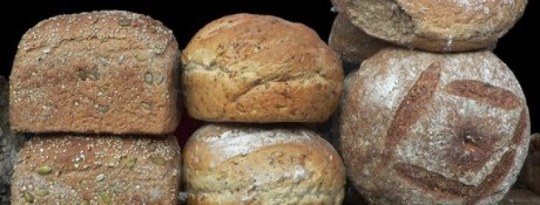
Many healthful diets, including the Mediterranean diet, recommend eating a fair amount of grains, as long as they’re whole grains, usually dark in color — brown rice or red quinoa, for instance. They claim that these provide a high-quality form of the fiber that we all need to stay healthy. Other diets, including several versions of the paleolithic diet, advise us to avoid all grains.
The rationale behind the so-called paleodiets is that our forebears began eating grains only about 10,000 years ago with the advent of agriculture. Grain had several clear advantages: You could store it for those times when animal food and seafood were in short supply, especially during the colder seasons. And the grains themselves were the seeds needed to plant new crops. According to paleodiet theory, though, we are genetically conditioned to thrive on a varied combination of fresh fruits, vegetables, nuts, lean game meat, and seafood, and a few natural oils like flax seed, walnut, and olive, without resorting to grains.
The paleodiet has much to recommend it, although, like many recent diets, it has also attracted controversy. Some nutritionists question whether we really know what humans ate two million years ago; the diet’s proponents, however, point to studies of the 80 or so contemporary hunter-gatherer tribes still thriving in various parts of the undeveloped world on just this kind of dietary regimen. Others question why we wouldn’t have adapted to grains and agricultural staples over a period of 10,000 years.
Classic Anti-Inflammatory Diet
Most of the paleodietary recommendations overlap with those of the classic anti-inflammatory diet that I heartily recommend, however, and I have no problem with its basic formula. If you get most of your nourishment from a wide assortment of fresh fruits and veggies; selected nuts and oils; seafood (especially fatty deep-sea fish rich in omega-3); lean cuts of pasture-fed beef, and some wild game animals and birds, including free-range chicken and turkey (skinless breasts as opposed to dark meat), it’s hard to see how you would either gain weight or set off an inflammatory cascade — unless you simply eat too much for your height and weight. And because protein tends to satiate your appetite, even that seems unlikely. You’ll have to get used to life without bagels, bread, pizza, croissants, cake, cereal, and all the other forms that grains can take, but cutting down on those will certainly help keep your weight down, too.
And eating fewer grains, especially baked goods, might not be so bad. Grains do raise a number of potentially inflammatory concerns, in part at least because so many people have developed allergies to certain grains, especially wheat. Because wheat and products made with wheat flour are so commonplace in our diet, wheat allergies may cause inflammatory reactions even among people who are not aware that they are allergic.
Gluten Intolerance
 Gluten — the composite of the proteins gliadin and glutenin — is the common name for the proteins in specific grains, including all forms of wheat (durum, semolina, spelt, kamut, einkorn, and faro) and related grains, such as rye, barley, and triticale. It shows up in many common food items from breakfast cereals, biscuits, and muffins to bread and pizza dough. Not all grains contain gluten, though, and those that are largely gluten-free include wild rice, corn, buckwheat, millet, amaranth, quinoa, oats, soybeans, and sunflower seeds.
Gluten — the composite of the proteins gliadin and glutenin — is the common name for the proteins in specific grains, including all forms of wheat (durum, semolina, spelt, kamut, einkorn, and faro) and related grains, such as rye, barley, and triticale. It shows up in many common food items from breakfast cereals, biscuits, and muffins to bread and pizza dough. Not all grains contain gluten, though, and those that are largely gluten-free include wild rice, corn, buckwheat, millet, amaranth, quinoa, oats, soybeans, and sunflower seeds.
Although gluten is a source of nutritional protein, it has some drawbacks. Some people have an intolerance to gluten, which can manifest in such ailments as celiac disease. Although celiac, a digestive disorder affecting both children and adults, is present in only about 1 in 133 people, its symptoms are serious. Your small intestine is lined with tiny, hair-like projections called villi, which absorb vitamins, minerals, and other nutrients from the food you eat. When people with celiac disease eat foods containing gluten, it creates an immune-mediated toxic reaction that causes damage to the villi. As a result, the villi are unable to absorb nutrients, which are flushed out with waste matter.
Gluten Sensitivity
A larger percentage of the population, which isn’t affected by celiac disease, can have an immune reaction to gliadin in gluten-based grains and their products, such as wheat flour. People with gluten sensitivity cannot properly digest gluten-based foods, and when gluten is undigested, your immune system interprets it as an invader that must be attacked.
The immune system’s attacks on gliadin can create large holes in the inside lining of the digestive tract, which may then be permeated and allow large gluten molecules to enter the blood stream. As the blood carries these molecules throughout your body, gluten molecules may settle anywhere and the immune system may then attack that part of the body. For this reason, people who are sensitive to gluten may suffer a wide range of illnesses far from the small intestine.
This article was excerpted with permission from the book:
 Stop Pain: Inflammation Relief for an Active Life
Stop Pain: Inflammation Relief for an Active Life
by Vijay Vad, M.D., with Peter Occhiogrosso.
Reprinted with permission of the publisher, Hay House Inc. Copyright © 2010. All rights reserved. www.hayhouse.com.
Click here for more info and/or to order this book on Amazon.
About the Author
 Vijay Vad, M.D., is a sports-medicine specialist at the Hospital for Special Surgery and a professor at Weill Medical College of Cornell University. He is the author of Back Rx and Arthritis Rx. In 2007, he created the Vad Foundation, dedicated to two causes: supporting medical research into back pain and arthritis, and funding education for disadvantaged girls worldwide. He co-founded The Inflasoothe Group in 2008. Visit his website at www.VijayVad.com.
Vijay Vad, M.D., is a sports-medicine specialist at the Hospital for Special Surgery and a professor at Weill Medical College of Cornell University. He is the author of Back Rx and Arthritis Rx. In 2007, he created the Vad Foundation, dedicated to two causes: supporting medical research into back pain and arthritis, and funding education for disadvantaged girls worldwide. He co-founded The Inflasoothe Group in 2008. Visit his website at www.VijayVad.com.



























